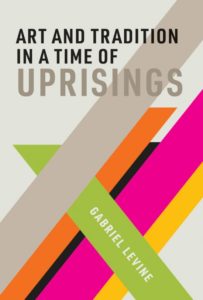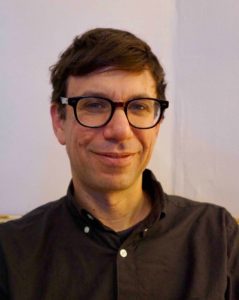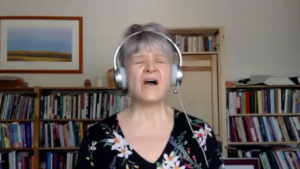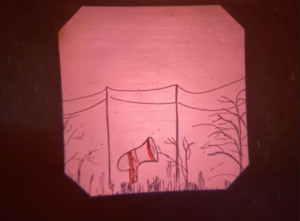Author: Carli Gardner
At Glendon, scholars adopt innovative approaches to researching relevant social issues and to understanding their impacts on contemporary society. In the context of the current COVID-19 pandemic, the work of Glendon researchers informs thinking about the socio-political implications of these historic events.
Dr. Gabriel Levine, sessional assistant professor of Drama Studies at Glendon, is an artist and scholar whose newly released book by The MIT Press, Art and Tradition in a Time of Uprisings explores what he calls “experiments with tradition” in the visual and performing arts. Levine’s book investigates how collective vernacular practices – participatory modes of doing, making and thinking – engage with and resist inherited traditions to reclaim and restore art and society.
 The virtual launch of Levine’s Art and Tradition in a Time of Uprisings on May 21st was presented by the Glendon Campus of York University and sponsored by the Centre for Research in Language and Culture Contact, the Department of Multidisciplinary Studies, the Glendon Indigenous Affairs Council, the Race Equity Caucus of Glendon, the Robarts Centre for Canadian Studies, and the Graduate Program in Theatre and Performance Studies.
The virtual launch of Levine’s Art and Tradition in a Time of Uprisings on May 21st was presented by the Glendon Campus of York University and sponsored by the Centre for Research in Language and Culture Contact, the Department of Multidisciplinary Studies, the Glendon Indigenous Affairs Council, the Race Equity Caucus of Glendon, the Robarts Centre for Canadian Studies, and the Graduate Program in Theatre and Performance Studies.
The event was a celebration of Levine’s 10 plus years of commitment to researching and participating in collective vernacular practices of social resistance.
A gathering of over 90 participants from around the globe, the virtual launch of Levine’s book effectively engaged with its audience members through ongoing discussion forums and by inventively using technology to host artistic performances.
From the visual performance by shadow artist Annie Katsura Rollins, to the vocal performance by interdisciplinary artist and singer/song writer Cheryl L’Hirondelle, Levine’s virtual book launch was a celebration of art in all its varied forms.
The performances echoed Levine’s dedication to studying and engaging with different modes of artistic production in and beyond his book Art and Tradition in a Time of Uprisings.
Levine’s interest in exploring different modes of artistic experimentation is evident in the three central case studies of his research: the yearly Purim Extravaganza, which gathers queer, leftist and Yiddishist New Yorkers in a re-appropriation of the springtime Jewish festival; the Ottawa-based Indigenous DJ collective “A Tribe Called Red,” who integrate pow wow drumming and singing with electronic dance music; and the revival of home fermentation practices from microbiological, philosophical, aesthetic and political angles.
Levine’s study of experimental and participatory art forms as methods of resisting forces of social oppression has interested the author for over 10 years.
As an activist and artist examining and participating in collective acts of social resistance, Levine was initially struck by the birth of social movements like “Occupy Wall Street” and “Idle No More” – times Levine describes as “moments of difficulty and danger.”
Today, the feeling of bearing witness to and participating in a social moment of pain and peril is all too familiar. Within the context of the current COVID-19 pandemic, the virtual launch of Levine’s Art and Tradition in a Time of Uprisings allowed participants and practitioners in the field to engage in meaningful discourse about what this present moment means for participation in collective vernacular practices.
Through thoughtful exchange between Levine and L’Hirondelle, the two artists drew from Levine’s research insights to question the status of art and performance during the current pandemic. In their discussion, Levine and L’Hirondelle emphasized a renewed importance in adapting traditional art forms with available resources to combat the restrictions placed on the act of creation during the pandemic.
In fact, L’Hirondelle names Art and Tradition in a Time of Uprisings as a tool to help practitioners modify artistic practices while still engaging with tradition. L’Hirondelle says: “[Levine’s] book is like a handbook about how to proceed into the future. It really is. In fact, we could put a post-it note [on it] and say: ‘art in a time of pandemic’ or ‘upheaval.’”
Although the future for artistic gatherings continues to be uncertain, Associate Professor and event emcee, Elaine Coburn, celebrates Levine for his refusal “to see rubble and even devastation as the end.” Coburn commends Levine for his “tenacious optimism rooted in practice and [his] insist[ance] that even in the ruins, there are new grounds for imaginative, generous play.”
Thanks to the virtual launch of Dr. Gabriel Levine’s Art and Tradition in a Time of Uprisings, a collective space for celebrating and experimenting was, and continues to be provided for community members to reflect on the connections between Levine’s research and current social issues.
To participate in ongoing discussions with artists and practitioners in the field, comments on the video recording of Levine’s launch continue to be welcomed here.
The Office of Research and Innovation at Glendon looks forward to organizing and hosting more such stimulating events.




